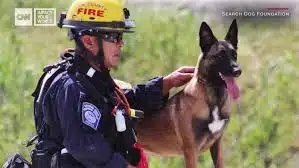In February 2018, following the Montecito mudslides, I wrote a post on search dogs. In it, I compared the Italian training facility, called the National School of Volpiano, near Turin with the National Disaster Search Dog Foundation (SDF) in Santa Paula, California. At that time, I had not visited either facility. But this year I had the honor of meeting SDF’s founder, Wilma Melville, and its Executive Director, George Haynes, and to tour the facility and meet both canines and other humans dedicated to saving lives during a disaster. I also discovered that SDF’s Operations and Systems Manager, Dave Lindee, along with his wife, lived and worked in Naples and Rome for many years. So, we arranged for an SDF tour of Italian-speaking friends from Santa Barbara. Both Dave and George led the way. We spoke in both Italian and English. The group was particularly fascinated by how search dogs are selected and trained.
It takes a very special dog to meet the demands of the SDF Training Program and to eventually join the ranks of the nation’s top search dogs. SDF’s screening program starts with finding shelter dogs throughout the country between one and two years of age. Hunting and herding dogs tend to have the desired traits; top breeds include Labrador Retrievers, Golden Retrievers, German Shepherds, Belgian Malinois, Border Collies, and Australian Shepherds. A mix of breeds works well too.
Search dogs must have an obsessive, visceral response to a toy—and an insatiable desire to chase, hunt and possess their coveted prize. SDF looks for dogs with intensity, focus and perseverance…that is, a dog that not only wants to work, but needs to work. These dogs are usually very challenging in a family home and are often turned into shelters because of their high energy level. A search dog must be athletic and show no hesitation hunting on unstable surfaces. Disaster sites contain challenging footing, so the dog must be agile.
Moreover, search dog candidates need to approach human and canine strangers with a neutral or curious, yet agreeable attitude. They cannot be aggressive or fearful. On the job, they encounter many distractions while they search for survivors: people, animals, food, trash, and loud noises. Through it all, they must remain intensely focused on the job at hand. And, of course, search dogs must be in excellent health and are given thorough exams during the screening process.
After passing SDF’s evaluation program, dogs complete eight to twelve months of training at SDF’s National Training Center, which is one of few facilities in America specifically designed for disaster search dog training. The Canine Pavilion can house up to 30 dogs at one time, and includes specialized grooming, enrichment, exercise and conditioning, and veterinary facilities. After extensive training, then it’s time for the dogs to be paired with their new handlers (usually firefighters) during the two-week Handler Course. Together, they return home and after months of bonding and training with their handler, search dogs are ready for certification. Even after a team is certified, it must continue training to maintain the focus, fitness, and skills necessary to be a Canine Disaster Search Team.
Even if a dog is unable to complete the search dog training, SDF cares for every canine that it has recruited. SDF never returns a dog to a shelter; it ensures care for the more than 210 canines who are retired or who have made a career change. They all become part of SDF’s Lifetime Care Program.

Founded in 1996, SDF is a nonprofit, non-government organization. SDF is the oldest nonprofit in the U.S. that recruits rescued dogs, gives them ongoing professional training, and partners them with first responders nationwide. SDF provides this life-saving resource at no cost to fire departments or task forces, providing emergency personnel with a critically important asset that would be a challenge for them to otherwise afford.
For more information, read Wilma Melville’s book, “Hero Dogs” (available through Amazon and other outlets) and go to https://searchdogfoundation.org or call (805) 646-1015 to see how you can support this remarkable organization.







